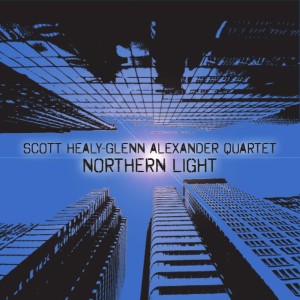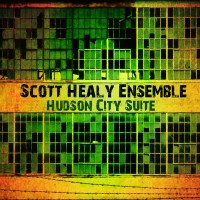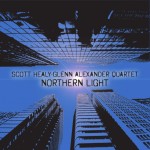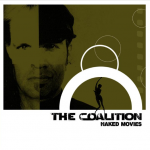Liner Notes: “Northern Light”
Liner Notes by Bill Milkowski
Sometimes we open up our closets and find timeless gems stored away there; elics from the past that take on a new, deeper meaning in the light of now. Such was the case when Scott Healy and Glenn Alexander rediscovered some old master tapes last year that they had essentially walked away from 20 years ago. Recorded in one unedited live session back in 1991 with bassist Kermit Driscoll and drummer Jeff Hirshfield, a remarkably empathetic rhythm tandem that longtime partners Healy and Alexander had been playing live gigs with around that time, this open-ended, highly interactive music holds up a lot better today than some of the music recorded in 1991 by their contemporaries.
What happened shortly after this quartet session is that Alexander got busy with his own solo projects and Healy got a full-time job in the house band for Late Night With Conan O’Brien (which commenced broadcasting on September 13, 1993). And the tapes were forgotten.
…this open-ended, highly interactive music holds up a lot better today than some of the music recorded in 1991 by their contemporaries. —
“The weird thing is, for the last 20 years I always knew it was there and I felt it was good but I didn’t want to listen to it,” says keyboardist Healy of Northern Light. “I didn’t have a clean copy of it because we didn’t walk out of the studio with CDs in those days. We did it direct to DAT and my DAT player had died about eight years ago, and by then we had all moved to hard disc recording. I didn’t have the DAT transferred to digital so it just sort of sat in the bin of masters for a while. I only had it on cassette, which is really unpleasant sounding. So I never listened to it.”
What sparked the sudden interest in this project from the past? As guitarist Alexander explains: “Just this last year I found a cassette of that session and brought it in to play to my students at Sarah Lawrence College, and they sort of went nuts on it. So I wrote Scott and said, ‘We did this thing 20 years ago but it really holds up.’ And he had the same reaction. He dug it up, listened to it and said, ‘Holy shit! I don’t know if I can play that well now.’ And one thing that knocked both Scott and myself out was our ability — and we have always had this — to play lines together, whether they’re in time or out of time. It’s like we can read each other’s minds.”
Adds Healy, “One guy will play something and the other guy will pick up on it. It’s as simple as that. Or they will not play something and let you get your idea in and sort of wait for you to make your idea and then do something to support that idea.”
Listening back to that session today, Alexander remains convinced that he now has a gem in hand. “I feel we play together, in a certain way, as well as anybody I know,” he says. “And I absolutely believe this is Scott’s best piano playing that he’s ever recorded on anything. I feel very confident in saying that. He just plays so mature and so great on all of his solos. I think it’s a combination of the tunes, the supportive musicians and the great piano sound. And to think we had let that go for 20 years. I can’t believe it!”
Like the Mahavishnu Orchestra’s The Lost Trident Session, which had remained in a Columbia Records vault for over 25 years before finally being released in 1999, the Scott Healy-Glenn Alexander Quartet’s Northern Light is the gem from their closet. But it is decidedly not a fusion offering, even though guitarist Alexander (a great admirer of fusion gods John McLaughlin, Allan Holdsworth and John Scofield) had dabbled in fusion on his own albums from the late ‘80s.
Indeed, some of these tracks sound more informed by the refined, intuitive playing of Keith Jarrett’s so-called American quartet (with bassist Charlie Haden and drummer Paul Motian) or the glistening chemistry between keyboardist Lyle Mays and guitarist Pat Metheny than the dense, throbbing fusion of the Mahavishnu Orchestra. At a time when rhythm tandems like Omar Hakim and Victor Bailey were locking it down tight with precision grooves on Michael Brecker’s Now You See It…Now You Don’t or Dennis Chambers and Anthony doing likewise on Mike Stern’s Odds Or Evens, Driscoll on upright bass and Hirshfield on drums were letting the music breathe with their Zen-like approach to time on Northern Light.
“I really give it up to the rhythm section for making this sound so good,” says Healy. “With different guys who are more concerned about quarter notes and phrase lengths, I think it would’ve been a much different thing. Because we’re all playing in time, the time is all there. But they’re able to float with you. And then when it starts to feel a little squirrely, they give you the downbeat or they reinforce where you feel it is. That kind of playing inspires your confidence, makes you relax a little bit and makes you further able to get even more expressive.”
That sparse, less-is-more approach can be heard on Healy’s free-spirited rubato opener, “Spiral,” which has Driscoll and Hirshfield emulating the telepathic hookup of Charlie Haden and Paul Motian. “I was used to drummers who would play the two feel or straight eighth feel with a real intensity and no breathing whatsoever,” says Healy. “But the way that Jeff plays on this is amazing. That has no time signature. It’s actually just notes on the page. Everyone nods when to come in. You sort of listen and once you learn the overall meter of it then you could play it together…once you get it in your ears.”
Alexander’s lyrical, buoyantly swinging “Christmas Day” was actually later recorded on his 1993 fusion album Rainbow’s Revenge. “I only did that because it seemed like we were never going to put this version out, so I re-recorded it,” says the guitarist. “But now listening to this recording of it, I actually much prefer this version with Kermit and Jeff. I just love the way it unfolds. It’s just so organic and not slick at all. And Scott played a killing piano solo on it.”
Healy’s “November” is a gentle, hymn-like heartland number that again recalls Jarrett and features Healy’s most mature, fully-realized piano solo of the session. “I had recorded this with my tentet in 1989 (Song Without Words),” says Healy, “but it was a long and detailed ensemble arrangement of a very simple tune. With our group with Glenn, we were playing most of the tunes from the lead sheet with no orchestration and very open arrangements, and this one fit perfectly.” Alexander also contributes a wonderful acoustic guitar solo here, which drew raves from his partner. “Glenn’s acoustic solo on ‘November’ is transcendental, and has about the best acoustic guitar sound I’ve ever heard,” says Healy. “He is to this day the most sensitive, empathetic and resourceful guitarist I’ve known. He really ‘gets’ me, and every line of his soloing on this recording is packed with content and meaning.”
Alexander’s “To The Point” opens with a burst of challenging, angular intervals from his guitar that Healy eventually doubles on piano. Driscoll and Hirshfield balance the tautness of their darting unisons with a relaxed, loosely swinging vibe underneath. “With a different bass and drums it could easily go in more of a fusiony sort of direction,” says the guitarist. “But because of the way that they play so loose underneath all of it makes it so inviting.”
Alexander’s “Chimes” opens with a sparse, reflective piano solo by Healy before developing into a stirring rubato ballad underscored by Hirshfield’s gentle brushwork. “The way he supports the soloists is amazing,” says Healy of the empathetic drummer. “Like when I go into my weird triplet thing on this tune where I go over the bar, he just stops playing and listens, and then he hits it. He finishes my phrases for me. It’s really remarkable.” Alexander makes effective use of reverb and volume pedal to create eerie violin-like swoops here before launching into a fluid warm-toned solo that beautifully matches the delicate vibe of the piece. Healy follows with a cascading piano solo that is buoyed by Driscoll’s sparsely contrapuntal bass lines.
Healy’s title track hinges on a simple ostinato figure doubled on piano and synth. “There’s barely anything to ‘Northern Light,’” says Healy, “the chart’s about half a page long with a 6/4 ostinato and a layered melodic figure, both of which devolve. I had the synth set up right next to the piano so I could reach over and play both at the same time, sort of treating the synth like just another voice, or an extension of the piano timbre. It’s a tricky piece but Glenn is someone who listens to where you want to go and he gets right to the core of it. There’s very little head-scratching with him. ” Driscoll, who plays fretless electric bass on this track, adds immeasurably to the mystique of this evocative closer.
Listening to Northern Light, it’s clear that the time is right for this out-of-time recording. “One of the things I think that now makes it sound good is that we’d had two decades of overproduction and insensitive rhythm section playing,” says Healy. “This idea of a bunch of guys playing free and really listening…we didn’t get that a lot during the ‘90s, I don’t think.”
It was a welcome relief then, it’s a happy discovery now. – Bill Milkowski
Bill Milkowski is a regular contributor to Jazz Times. He is also the author of “JACO: The Extraordinary and Tragic Life of Jaco Pastorius” and co-author of “Here And Now! The Autobiography of Pat Martino” (both on Backbeat Books)





